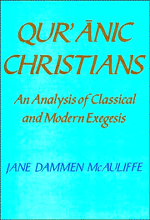Book contents
- Frontmatter
- Contents
- Acknowledgments
- Abbreviations
- Introduction
- PART I QURʾĀNIC COMMENTARY AND COMMENTATORS
- PART II QURʾĀNIC COMMENDATION OF CHRISTIANS
- 3 Nazarenes of faith and action
- 4 Followers of the Qurʾānic Jesus
- 5 Steadfast and submissive
- 6 The promised bounty of piety
- 7 The praiseworthy amity of Christians
- 8 Christians as pre-Qurʾānic Muslims
- 9 Compassion, mercy, and monasticism
- Conclusion
- Works cited
- Index of Qurʾānic verses
- Index of names and subjects
7 - The praiseworthy amity of Christians
Published online by Cambridge University Press: 24 February 2010
- Frontmatter
- Contents
- Acknowledgments
- Abbreviations
- Introduction
- PART I QURʾĀNIC COMMENTARY AND COMMENTATORS
- PART II QURʾĀNIC COMMENDATION OF CHRISTIANS
- 3 Nazarenes of faith and action
- 4 Followers of the Qurʾānic Jesus
- 5 Steadfast and submissive
- 6 The promised bounty of piety
- 7 The praiseworthy amity of Christians
- 8 Christians as pre-Qurʾānic Muslims
- 9 Compassion, mercy, and monasticism
- Conclusion
- Works cited
- Index of Qurʾānic verses
- Index of names and subjects
Summary
The most striking example of Qurʾānic praise of Christians occurs in sūrat al-māʾidah (5):82–83. These verses figure prominently in virtually all attempts to base Muslim-Christian rapprochement upon specific Qurʾānic texts. The passage itself constitutes an exegetical challenge of considerable proportions. Within the verses one finds a configuration of seven categories: the Jews, the idolaters (mushrikūn), ‘those who believe’, the Christians, priests and monks (qissīsūn wa-rubbdān), those who hear what was sent down upon Muḥammad and weep, and, finally, those who bear witness (shāhidūn). Obviously, issues of identification will occupy a considerable portion of the exegetical effort expended on this pericope, as will the desire to ascertain the circumstances surrounding this revelation (asbāb al-nuzūl). One possible translation of sūrat al-māʾidah (5):82–83 is as follows:
You will find the people most intensely hostile to the believers are the Jews and the idolaters. You will surely find those closest in friendship to those who believe to be those who say “We are Christians.” That is because among them are priests and monks and because they are not arrogant. (82)
When they heard what was sent down to the Messenger their eyes overflowed with tears because of what they recognized as the truth. They say, “Our Lord, we believe, so write us with those who testify (shābidūn).” (83)
THOSE PERSONS WHO ELICIT PRAISE
Al-Ṭabarī begins his discussion of 5:82 with a rapid survey of the principal groups mentioned. He then proceeds to evaluate the various views proposed about the occasion for this revelation.
- Type
- Chapter
- Information
- Qur'anic ChristiansAn Analysis of Classical and Modern Exegesis, pp. 204 - 239Publisher: Cambridge University PressPrint publication year: 1991



